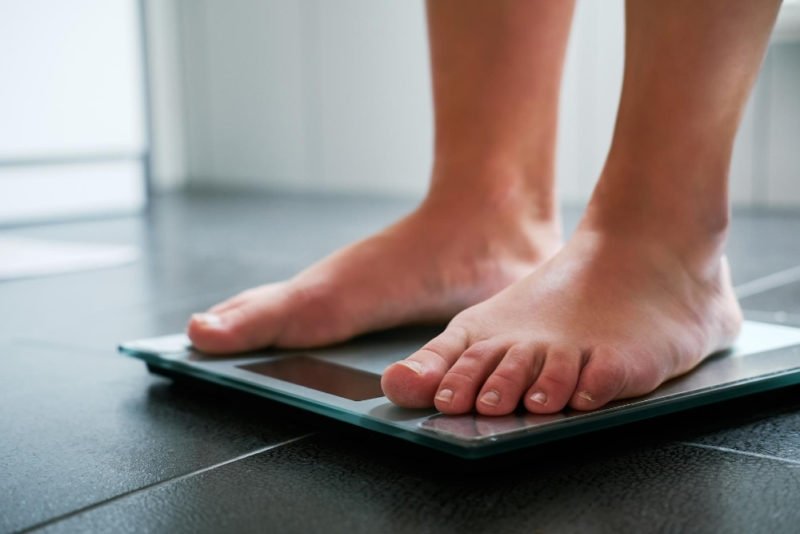
I’m typically requested what “non-diet” truly means, each typically phrases, and particularly when a dietitian or different healthcare supplier describes their method as “non-diet” or “anti-diet.” What’s a non-diet method, and is non-diet weight reduction actually a factor?
These are wonderful questions, as a result of these phrases (“non-diet” greater than “anti-diet,” I believe) are sometimes misrepresented, both deliberately or by accident. I as soon as really feel into the latter camp, I’m afraid. Let me begin with what it means to be non-diet or have a non-diet method, after which I’ll speak about how these concepts might get twisted into one thing else.
Alongside the best way, I’ll additionally speak about how speaking a few “non-diet” method feels slightly totally different now in an age once we’re being bombarded with articles and TV specials about “miracle” weight reduction medicine.
The spirit of “non-diet”
Whereas my actual phrases might differ barely from what one other non-diet dietitian would possibly say when you requested them this query, I outline “non-diet” as not setting my purchasers on a path the place they’re deliberately attempting to shrink their our bodies or change their form. I don’t assist counting of energy or fats grams or carbs or factors within the curiosity of altering physique dimension or form, or of attempting to look extra muscular.
This contains not deliberately pursuing weight reduction, however this doesn’t imply that I refuse to debate the need for weight reduction, as a result of the strain is actual — from society, from healthcare suppliers, from household, from ourselves. (“I know weight-reduction plan has by no means resulted in something good for me, however I nonetheless really feel the urge to strive only one extra time.”) I need to present a secure area to debate these items.
I additionally don’t assist inflexible diets within the title of well being the place they don’t seem to be obligatory. For instance, I don’t assist inflexible “clear consuming” diets or the “autoimmune protocols” which are out there wherever books are bought regardless of not being primarily based on precise scientific proof. This doesn’t imply I gained’t assist somebody eat in an evidence-based manner to assist a recognized well being situation or threat issue, comparable to pre-diabetes or irritable bowel syndrome.
Actually, I actively assist purchasers break free from inflexible diets and consuming patterns. With some purchasers, which means breaking apart with weight reduction diets. For others which means therapeutic from orthorexia (an unhealthy obsession with consuming healthfully). That doesn’t imply well being doesn’t matter — it does for all my purchasers. However tlisted below are some ways to look after well being that don’t require manipulating our our bodies or sustaining an obsessive relationship with meals and bodily exercise.

What will get portrayed as a “non-diet” method?
As I discussed, I didn’t aways observe this fashion. Actually, for greater than three years, I practiced what I known as a “non-diet” method to weight administration. I now perceive that’s not truly a factor, as a result of the intentional pursuit of weight reduction is the very definition of “food plan” (setting apart the broader definition of “food plan” as in “how we eat”).
After I helped sufferers do “non-diet” weight-reduction plan, I didn’t ask them to rely energy, carbs, fats, and many others. I did assist them make modifications modifications — comparable to being “conscious” about portion sizes — with the categorical aim of dropping pounds, and I weighed lots of them each time I noticed them. My rising discomfort with the truth that I used to be contributing to the obsession with a quantity on a scale lead me to make some profession modifications.
The concept of “non-diet” is usually misappropriated by “wellness tradition.” The commonest manifestation of it is a strict food plan plan that purports to assist “optimum well being” or heal a nebulous set of signs which are allegedly because of an autoimmune response, meals sensitivities, leaky intestine or one thing comparable.
I’m pondering of 1 well-liked protocol (which has a number of books to its title) that particularly states that it’s not supposed as a weight reduction food plan, but in addition they say that many individuals do lose some weight. I’m fairly certain that each consumer of mine who has ever tried it up to now did so with the intent of dropping pounds, even when their main intent was “well being.”
Typically, the co-opting of “non-diet” is way extra blatant. Many weight-loss apps and applications say issues like “[Name of app] is just not a food plan — weight-reduction plan shouldn’t be painful.” Properly, these are diets, and I’ve had purchasers who began working with me as a result of an app or program claiming to be “non-diet” re-triggered their binge consuming or began to ship them again down a scary path to meals and train obsession. Happily, that they had the self-awareness to note the warning bells going off of their heads.
Now, we have now pharmaceutical firms co-opting “non-diet” in a brand new manner — “Diets don’t work, it’s not your fault, take our drug as a substitute.” However these medicine aren’t benign. They strip away urge for food, they will make it onerous to eat sufficient to make dietary wants, they usually can have much more critical uncomfortable side effects.

If not weight-reduction plan, then what?
Food regimen tradition and wellness tradition are so entangled that, actually, it’s onerous to separate them. The introduction of recent weight reduction medicine has made this extra difficult. This simply furthers the concept the primary factor you are able to do in your well being is to drop a few pounds, even when you inform your self the modifications you make aren’t actually about dropping pounds, they’re about well being.
That is one thing that additionally journeys up many individuals who begin dabbling in Intuitive Consuming. Actually, to my nice dismay (and to the even higher dismay of the 2 dietitians who developed the Intuitive Consuming mannequin), there are dietitians and different healthcare practitioners who truly market themselves as providing weight reduction via intuitive consuming.
Should you ever witness this, run the opposite manner. It means they don’t seem to be truly licensed in Intuitive Consuming, as a result of you can’t observe intuitive consuming whereas pursuing weight reduction.
Now, lots of my purchasers who come to me to be taught Intuitive Consuming do nonetheless want weight reduction. Usually, they’re within the strategy of breaking apart with weight-reduction plan, however are nonetheless a bit on the fence. A few of them are contemplating a weight reduction drug, actually because their physician is pushing them in that path.
As soon as food plan tradition will get its tenterhooks in you, it could possibly take a while to grow to be actually freed from it. Typically, they really feel fairly determined for food plan tradition ideas, emotions and urges to simply go away. I get it. And I’ve been there.
Associated posts:

What if you’d like weight reduction AND meals peace?
I remind my purchasers who’re fighting food plan ideas that we will’t management our ideas and emotions, however we will select to not act on them, and we will develop methods to driving the wave of a food plan urge till it fades away. What’s essential is that you simply don’t pursue weight reduction whereas attempting to grow to be an intuitive eater. That is tremendous essential for 2 causes:
- It’s inconceivable to observe the ideas of intuitive consuming (together with honoring your starvation, feeling your fullness and making peace with meals) if you’re centered on the scales, or on what number of energy or carbs are in what you simply ate.
- Intuitive Consuming helps the physique discover it’s pure weight vary, and which may be larger, decrease, or about the identical, in comparison with the place somebody began. This typically relies on the diploma to which somebody was limiting (because of weight-reduction plan or a restrictive consuming dysfunction) or consuming in extra of their physique’s fullness and satisfaction cues (because of binge consuming, extreme emotional consuming, or just not having the ability to hearken to their physique).
I by no means promise weight reduction with intuitive consuming, for these causes I simply acknowledged. I’ve noticed #1 and #2 in my purchasers (though my purchasers typically cease weighing themselves, so it’s onerous to be exact about any weight modifications). What they do universally acquire is a higher sense of ease with meals, and they’re able to get pleasure from consuming healthfully in a balanced manner.
For some, which means being much less inflexible, being OK with ok fairly than striving for “good.” For others which means truly consuming extra nutritiously, as a result of for the primary time they’re listening to what their physique desires, fairly than simply grabbing no matter’s useful. That’s a lot simpler whenever you let go of the thought of “good” and “unhealthy” meals so that you’re making decisions from a much less emotionally charged mindset.

The non-diet backside line, and the significance of consent
To sum up, when you ever see “non-diet” utilized in affiliation with limiting energy, carbs, fats, factors (or some comparable measure), or with altering physique dimension and form, then it isn’t “non-diet”!
I additionally need to reiterate that I don’t decide individuals for desirous to drop a few pounds (given the society we reside in and the food plan tradition waters we swim in). Neither would any true non-diet dietitian worthy of that time period. It’s simply that there are higher, extra holistic methods to method true bodily and psychological/emotional well being, and we assist individuals discover these methods.
I additionally assist totally knowledgeable consent-based determination making at any time when the subject of weight comes up in connection to well being, particularly now with so many docs desperate to prescribe weight reduction medicine, and a lot hype about these medicine being a “miracle” (they aren’t).
What are potential dangers and sure uncomfortable side effects? Do we all know, primarily based on the proof, that dropping pounds would truly produce a desired well being end result, or is the push for weight reduction primarily based on an assumption that when you don’t drop a few pounds you’ll sooner or later within the unexpected future develop a well being downside (one thing that may very well be true for anybody, of any weight). Are you keen to be on the drug endlessly? What would that imply financially and when it comes to the standard of a life the place it might really feel onerous to even eat? So many questions, and I worry that in lots of instances, they aren’t being totally addressed.
Carrie Dennett, MPH, RDN, is a Pacific Northwest-based registered dietitian nutritionist, freelance author, intuitive consuming counselor, writer, and speaker. Her superpowers embody busting vitamin myths and empowering girls to really feel higher of their our bodies and make meals decisions that assist pleasure, vitamin and well being. This put up is for informational functions solely and doesn’t represent individualized vitamin or medical recommendation.
Looking for 1-on-1 vitamin counseling? Carrie presents a 6-month Meals & Physique program (intuitive consuming, physique picture, mindfulness, self-compassion) and a 4-month IBS administration program (low-FODMAP food plan teaching with an emphasis on rising meals freedom). Go to the hyperlinks to be taught extra and e-book a free intro name to see if this system is an effective match, and if we’re a great match!
